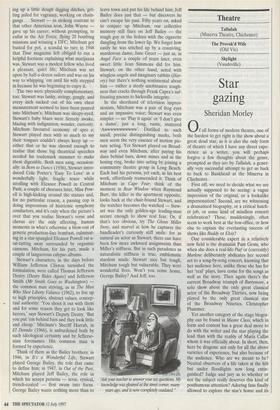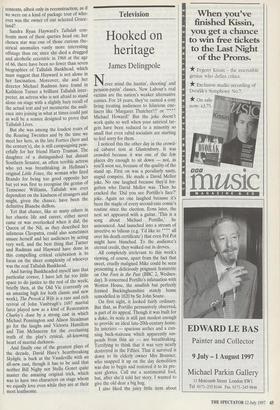Theatre
Tallulah (Minerva Theatre, Chichester) The Provok'd Wife (Old Vic)
Skylight (Vaudeville)
Star gazing
Sheridan Morley
0 f all forms of modern theatre, one of the hardest to get right is the show about a great dead star; as it is also the only form of theatre of which I have any direct expe- rience as a writer, you will perhaps forgive a few thoughts about the genre, prompted as they are by Tallulah, a gener- ally very successful attempt to get us back to back to Bankhead at the Minerva in Chichester.
First off, we need to decide what we are actually supposed to be seeing: a vague impression of the original, or a lookalike impersonation? Second, are we witnessing a dramatised biography, or a critical hatch- et job, or some kind of mindless concert celebration? These, maddeningly, often seem to work best at the box-office, or how else to explain the everlasting success of shows like Buddy or Elvis?
One considerable expert in a relatively new field is the dramatist Pam Gems, who when she does a real-life Piaf or (currently) Marlene deliberately abdicates her second act to a song-by-song concert, knowing that her audience here, unlike those she has for her 'real' plays, have come for the songs as well as the story. Then again there's the current Broadway triumph of Banymore, a solo show about the only great classical actor of the Broadway Thirties, now being played by the only great classical star of the Broadway Nineties, Christopher Plummer.
Yet another category of the stage biogra- phy can be found in Master Class, which in form and content has a great deal more to do with the writer and the star playing the lead than with the reality of Maria Callas whom it was officially about. In short, then, here be dragons: not only for all the above varieties of experience, but also because of the audience. Who are we meant to be? Neutral observers of a life taken at the hilt but under floodlights now long extin- guished? Judge and jury as to whether or not the subject really deserves this kind of posthumous attention? Adoring fans finally allowed to explore the star's home and its contents, albeit only in reconstruction, as if we were on a kind of package tour of who- ever was the owner of our selected Grace- land?
Sandra Ryan Hayward's Tallulah con- fronts most of these queries head on; her chosen star was one of those curious the- atrical anomalies vastly more interesting offstage than on; since she died a drugged and alcoholic eccentric in 1968 at the age of 66, there have been no fewer than seven biographies of Tallulah Bankhead, which must suggest that Hayward is not alone in her fascination. Moreover, she and her director Michael Rudman have found in Kathleen Turner a brilliant Tallulah inter- preter, an actress who is not afraid to stand alone on stage with a slightly hazy recall of the actual text and yet mesmerise the audi- ence into joining in what at times could just as well be a seance designed to prove that Tallulah Lives.
But she was among the loudest roars of the Roaring Twenties and by the time we meet her here, in the late Forties (hers and the century's), she is still campaigning pow- erfully for her friend Harry Truman. The daughter of a distinguished but distant Southern Senator, an often terrible actress who yet was breathtaking in Hellman's original Little Foxes, the woman who fired Brando for being too good opposite her but yet was first to recognise the genius of Tennessee Williams, Tallulah was ever dependent on the kindness of strangers and might, given the chance, have been the definitive Blanche duBois.
Yet that chance, like so many others in her chaotic life and career, either never came or was overlooked when it did; the Queen of the Nil, as they described her infamous Cleopatra, could also sometimes amaze herself and her audiences by acting very well, and the best thing that Turner and Rudman and Hayward have done in this compelling critical celebration is to focus on the sheer complexity of whoever was the real Tallulah Bankhead.
And having Bankheaded myself into that particular corner, I have left far too little space to do justice to the rest of the week; briefly then, at the Old Vic (currently on an amazing high for both classic and new work), The Provok'd Wife is a rare and rich revival of John Vanbrugh's 1697 marital farce played now as a kind of Restoration Charley's Aunt by a strong cast in which Michael Pennington and Alison Steadman go for the laughs and Victoria Hamilton and Tim Mclnnerny for the everlasting truth of the play's cynical, all-knowing heart of marital darkness.
And finally one of the greatest plays of the decade, David Hare's heartbreaking Skylight, is back at the Vaudeville with an all-new cast, though it has to be said that neither Bill Nighy nor Stella Gonet quite master the amazing original trick, which was to have two characters on stage whom we equally love even while they are at their most loathsome.



























































 Previous page
Previous page